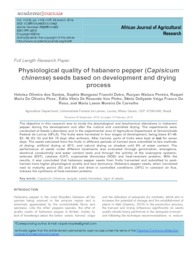Physiological quality of habanero pepper (Capisicum chinense) seeds based on development and drying process.
Physiological quality of habanero pepper (Capisicum chinense) seeds based on development and drying process.
Autoria: SANTOS, H. O. dos; DUTRA, S. M. F.; PEREIRA, R. W.; PIRES, R. M. De O.; VON PINHO, E. V. de R.; ROSA, S. D. V. F. da; CARVALHO, L. M. de
Resumo: The objective in this research was to study the physiological and biochemical alterations in habanero pepper during the development and after the natural and controlled drying. The experiments were conducted at Seeds Laboratory and in the experimental area of Agriculture Department at Universidade Federal de Lavras (UFLA). The fruits were harvested in four stages of development, being these E1-49, E2- 56, E3- 63 and E4- 70 days after anthesis. After harvest, parts of fruits were kept at rest for seven days. The seeds extracted from the fruits in different periods of harvest were submitted to two methods of drying: artificial drying at 35°C, and natural drying on shadow until 9% of water content. The performance of seeds under different treatments was evaluated through germination, emergence, electrical conductivity and water content tests and through the activity of the isoenzyme systems; esterase (EST), catalase (CAT), superoxide dismutase (SOD) and heat-resistant proteins. With the results, it was concluded that habanero pepper seeds from fruits harvested and submitted to postharvest have higher physiological quality and less dormancy. Habanero pepper seeds, when harvested next to maturity points (E3 and E4) and dried in controlled conditions (35ºC) in constant air flux, induces the synthesis of heat-resistant proteins.
Ano de publicação: 2016
Tipo de publicação: Artigo de periódico
Unidade: Embrapa Café
Palavras-chave: Capsicum chinense Jacquin, Seeds formation, Vigor of seeds
Observações
1 - Por padrão são exibidas publicações dos últimos 20 anos. Para encontrar publicações mais antigas, configure o filtro ano de publicação, colocando o ano a partir do qual você deseja encontrar publicações. O filtro está na coluna da esquerda na busca acima.
2 - Para ler algumas publicações da Embrapa (apenas as que estão em formato ePub), é necessário ter, no celular ou computador, um desses softwares gratuitos. Sistemas Android: Google Play Livros; IOS: iBooks; Windows e Linux: software Calibre.
Acesse outras publicações
Acesse a Base de Dados da Pesquisa Agropecuária (BDPA) para consultar o acervo completo das bibliotecas da Embrapa.

